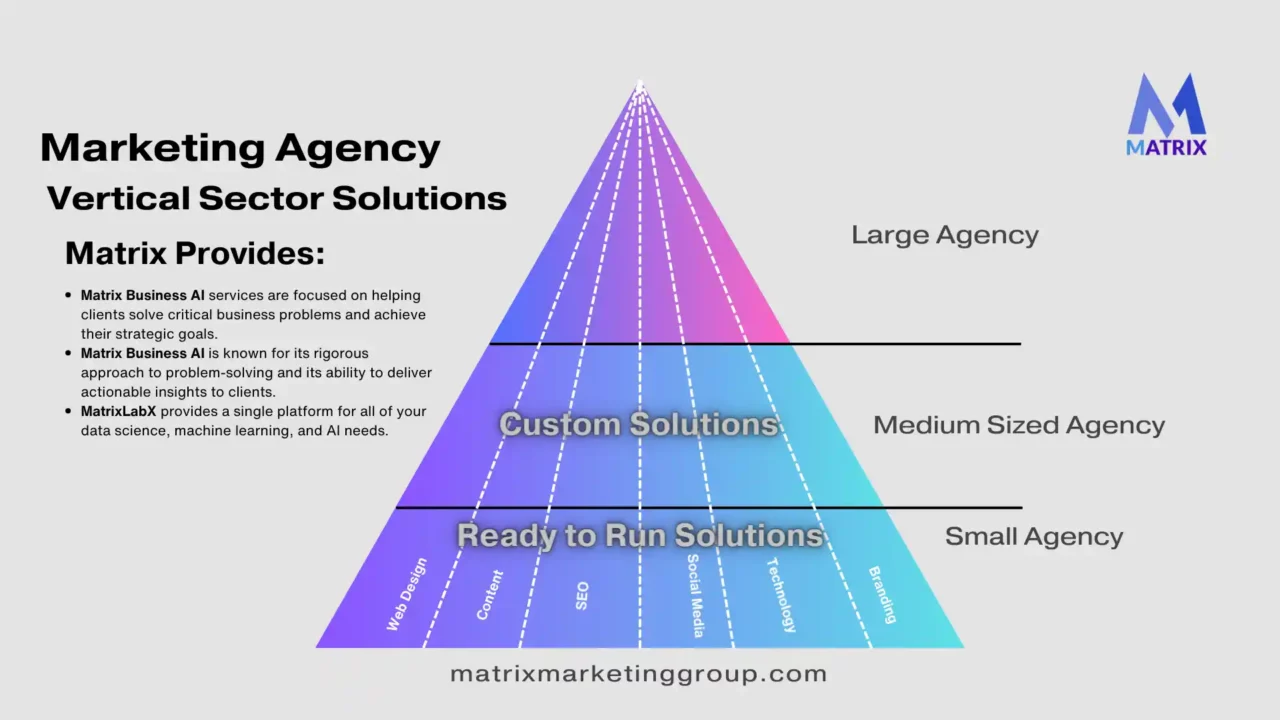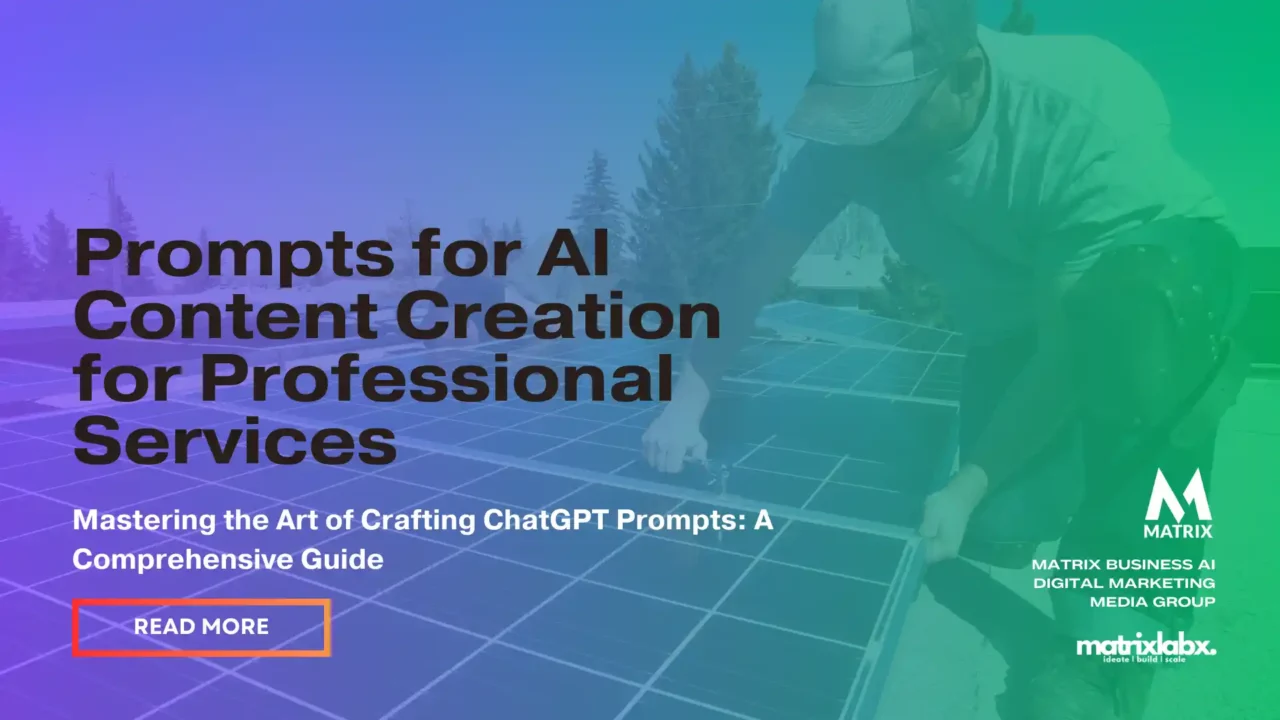Prompts for AI Content Creation for Professional Services
Learn About Prompts for AI Content Creation for Professional Services.
Captivating Your Audience in the Age of Artificial Intelligence
In the dynamic world of professional services, where innovation and expertise drive success, adopting Artificial Intelligence (AI) in content creation marks a revolutionary shift.
As we embark on this transformative journey, it’s crucial to understand how AI can streamline content creation and amplify its impact, resonating deeply with your target audience.
A Timeless Framework for Engaging Content
At the heart of effective AI-driven content. This model has stood the test of time, guiding creators in crafting messages that capture attention, pique interest, stir desire, and prompt action.
The First Step in a Captivating Journey
The first challenge in the digital landscape is capturing attention. AI excels here by analyzing vast data sets to identify trends, preferences, and behaviors, enabling content creators to develop highly targeted and relevant material.
Imagine headlines and visuals tailored to the exact interests of your audience, backed by AI’s deep learning capabilities. This precision in understanding what grabs attention is a vital asset in the overcrowded world of online content.
Building a Connection that Lasts
Once attention is captured, AI helps maintain interest and nurture desire by personalizing content.
Through predictive analytics and natural language processing, AI tools can create content that speaks directly to individual needs and challenges, making every piece of content feel like a one-on-one conversation with your audience. In professional services, where trust and credibility are paramount, such personalized and insightful content can set you apart from competitors.
Turning Engagement into Results

AI-driven content creation ensures that calls to action are compelling, timely, and contextually relevant, increasing the likelihood of conversion.
Whether signing up for a webinar, downloading a whitepaper, or seeking a consultation, AI can optimize these elements to align seamlessly with the user’s journey, ensuring that every piece of content serves a strategic purpose in your broader marketing and sales goals.
In conclusion, integrating AI in content creation for professional services is not just about keeping up with technology but leading with innovation.
By leveraging AI to master the AIDA model, you can create content that captures attention and builds lasting connections, driving growth and success in an increasingly competitive landscape.
Here are some interesting statistics about AI content creation for professional services that highlight the rapidly evolving landscape:
- Widespread Use for Blog Content Creation: A staggering 85.1% of AI users utilize AI for blog content creation, showing a significant reliance on AI in content marketing.
- Quality Perception: About 65.8% of people find AI-generated content equal to or better than human writing. This indicates a growing trust and satisfaction with AI-produced material.
- Marketing and Sales Impact: AI algorithms have been shown to increase leads by as much as 50%, demonstrating their significant impact on marketing and sales strategies.
- Adoption in Telecommunications: 52% of telecommunications organizations use chatbots to increase overall productivity, a testament to the efficiency and effectiveness of AI in customer interaction.
- Generative AI in Content Creation: Generative AI in content creation will continue expanding in popularity throughout 2024. This includes applications in tailored blog posts, social posts, and personalized email campaigns.
- AI’s Role in Customer Service: 75% of consumers are comfortable with chatbots handling routine customer service tasks. This points towards a significant shift in consumer acceptance of AI in customer interaction.
- Chatbots in Marketing: In a 2022 survey, 57% of B2B marketers used chatbots to understand their audience better, indicating AI’s growing role in market research and customer engagement.
- Financial Impact on Industries: The professional services industry is expected to gain an additional $1.85 trillion from AI by 2035, highlighting the substantial economic impact of AI adoption in various sectors.
- Positive Outlook Among Marketers: 60% of marketers feel positive about the rise of the AI industry, reflecting a generally optimistic view of AI’s role in the future of marketing.
- Pragmatic AI in Professional Services: 2024 will be a year of pragmatic AI deployment, focusing on ethical AI governance and explainable AI systems.
These statistics underscore the profound influence and rapidly increasing adoption of AI in content creation and professional services, marking a significant shift in how businesses approach marketing, customer service, and operational efficiency.
Navigating the Uncharted Waters: The Three Major Challenges of AI Content Creation in Professional Services
1. The Balancing Act: Striking Harmony between Human Creativity and AI Efficiency
In the ever-evolving landscape of professional services, integrating AI in content creation presents a unique challenge: maintaining the delicate equilibrium between human ingenuity and AI’s efficiency.
As AI technologies become increasingly adept at generating content, businesses risk losing the human touch that is often the hallmark of personalized service. This challenge extends beyond content creation; it strikes at the core of brand identity and customer relationships.
Companies must find a way to harness AI’s power without diluting the creativity and emotional intelligence that only human professionals can offer. The key lies in creating a synergy where AI enhances human creativity rather than replacing it, and a task easier said than done in a world where the capabilities of AI continue to astonish and expand.
2. The Authenticity Dilemma: Preserving Trust in the Age of AI-Generated Content
Another hurdle in AI-driven content creation is maintaining authenticity and trust.
As AI tools become more sophisticated, they can produce indistinguishable content from that created by humans. This raises an ethical question about transparency: should businesses disclose the use of AI in their content creation?
The challenge is twofold – on the one hand, there’s a need to embrace the efficiency and scalability of AI. On the other, there’s the imperative to maintain trust and transparency with clients who might be skeptical of AI-generated advice or insights.
This issue becomes even more pronounced in sectors like law or financial services, where the accuracy and personalization of information are paramount. Businesses must navigate these waters carefully, ensuring that they do not compromise on the trust and confidence their clients place in them.
3. The Data Dependency: Ensuring Quality in AI’s Learning Process
AI’s ability to generate content is only as good as the data it’s trained on. This dependency poses a significant challenge for businesses in the professional services sector.
The need for high-quality, relevant, and unbiased data is critical. Still, it’s also a significant hurdle, particularly for niche or specialized fields where such data may be limited or harder to come by.
There’s also the ever-present risk of AI perpetuating biases in the training data, leading to misinformation or harmful content. Businesses must invest in collecting vast amounts of data and ensuring the quality and integrity of this data.
This process involves continuously monitoring and updating AI models to reflect the latest industry trends and ethical standards, requiring a significant investment of resources and expertise.
Charting a Course Through AI’s Potential and Pitfalls
Integrating AI into content creation for professional services is fraught with challenges, but it is also one brimming with potential.
From striking the right balance between humans and machines to maintaining trust and managing data quality, businesses are navigating a complex but exciting landscape.
The key to success lies in understanding and strategically addressing these challenges, ensuring that AI becomes a powerful ally in the quest for innovation and excellence in professional services.
As we look toward the future, it is clear that those who can adeptly maneuver through these challenges will emerge as leaders in a new digital transformation era.
Ditch the Pixel Dungeon: Forge Your Perfect Headless Website
Forget clunky templates and pixelated walls. Build a website that dances with AI that breathes personalization, and leaves your visitors screaming (in a good way). Headless development unleashes endless possibilities. Join us and craft your digital masterpiece. Dare to break the internet? Contact us today!

Deciphering the AI Revolution in Professional Services: A Comprehensive Exploration
Who is Leading the Charge in AI-Powered Content Creation?
In the rapidly evolving world of professional services, a new protagonist has emerged: Artificial Intelligence (AI).
The ‘who’ in this narrative is diverse players, including tech-savvy marketing agencies, forward-thinking law firms, innovative consulting companies, and financial institutions on the cutting edge of technology.
These entities are not just adopting AI; they are pioneering its use in creating content that’s not only efficient but also insightful and engaging. The leadership in this space is a fascinating mix of AI developers, content strategists, and industry experts who collectively push the boundaries of how professional services communicate and engage with their audience.
What Exactly is AI Content Creation in Professional Services?
The ‘what’ centers around the application of AI for generating a wide array of content – from analytical reports and market predictions to insightful blog posts and engaging social media updates.
In professional services, this translates to AI algorithms that can digest complex data sets, extract meaningful insights, and articulate these in a manner that resonates with a specific audience. It’s about leveraging machine learning and natural language processing to produce content that is not just factually accurate but also aligns with the tone and style of the respective professional field.
The scope of AI content creation extends to enhancing user experience through personalized content, automating routine communications, and providing clients with timely, relevant information.
Where is AI Content Creation Making its Mark?
The ‘where’ of this AI revolution is both geographical and sectoral. It geographically spans global financial hubs, tech centers, and wherever professional services thrive.
AI is making its presence felt, from the high-rise offices in New York and London to the bustling business districts in Singapore and Tokyo.
Sectorally, the impact of AI in content creation is pervasive across various professional services – law, finance, consulting, and accounting, to name a few.
Each sector is finding unique applications for AI, tailoring it to meet specific industry needs and client expectations. This geographical and sectoral spread highlights the versatility and adaptability of AI in different professional contexts.
When Did AI Content Creation in Professional Services Begin, and What’s the Future?
The ‘when’ traces back to the last few years, when there has been a significant uptick in AI adoption, but the future is even more intriguing.
The journey began as AI demonstrated its prowess in generating simple content but it has rapidly evolved. The future portends a scenario where AI not only creates content but also anticipates the needs of its audience, offering predictive insights and proactive solutions.
The ongoing advancements in AI promise a future where its role in content creation becomes more sophisticated, intuitive, and integral to the fabric of professional services.
Why is AI Content Creation a Game-Changer in Professional Services?
The ‘why’ delves into AI’s core benefits and transformative potential in content creation. AI brings unprecedented efficiency, scalability, and precision to the content creation.
It enables professional services to handle large content demands without compromising quality or relevance.
Furthermore, AI-driven content is not limited by human constraints; it can analyze vast data sets, identify trends, and generate insights at a speed and depth that is humanly unattainable. This capability is vital in industries where staying abreast of the latest developments and tailoring communication to client needs is crucial for success.
Ultimately, AI content creation is not just about keeping up with technological advancements; it’s about redefining how professional services operate, engage with clients, and position themselves in a competitive marketplace.
Embracing the AI Content Creation Era in Professional Services
AI content creation in professional services is a multifaceted phenomenon, driven by diverse industry leaders, applied across various sectors, and spread globally. Its journey from a novel concept to an integral business tool signifies a broader shift toward digital innovation in professional services.
The future of AI in this realm is not just promising; it’s already unfolding, paving the way for more personalized, efficient, and impactful client engagements. As we navigate this exciting era, one thing is certain: AI content creation is not just a trend; it’s a transformative force reshaping the professional services industry.
Harnessing AI for Brilliance in Professional Services: Three Groundbreaking Use Cases
Transforming Legal Research with AI-powered Precision
Before AI: The legal profession is notorious for its reliance on extensive research and analysis, often requiring countless hours of labor-intensive work.
Lawyers and paralegals spend significant time sifting through case laws, statutes, and legal precedents. This process, while critical, is incredibly time-consuming and often leads to delays in case preparation and client advisement.
After AI: Enter the revolutionary world of AI in legal research. AI algorithms, trained on vast legal databases, can analyze and extract relevant information in a fraction of the time it takes a human. These systems identify pertinent case laws and statutes and provide insights into legal trends and judge-specific rulings.
Implementing AI in legal research transforms the landscape of legal services. Law firms can now offer faster, more efficient, and precise legal advisories. This efficiency enhances client satisfaction and lets lawyers focus on strategy and case preparation, leading to more successful outcomes and a competitive edge in the legal marketplace.
Revolutionizing Financial Forecasting with AI-Driven Analysis
Before AI, financial advisors and analysts relied on historical data and market trends to predict and guide investment strategies. This approach, while informative, is limited by the human capacity to process large datasets and often needs to catch up on subtle patterns or emerging trends.

Stop Wasting Ads! Get Laser-Targeted Clicks (and Customers)
Tired of ad duds? Get eyeballs on your brand with laser-focused online ads that convert. Click to unleash the power of targeted marketing!

Stop Scrolling, Start Selling: Social Ads That Convert Like Crazy
Get ready to unleash the power of AI-targeted ads that turn likes into leads and leads into SALES.
After AI: With the advent of AI in financial services, the game has changed dramatically. AI systems can process and analyze massive amounts of financial data from various sources in real time. They can identify market trends, predict stock performance, and even anticipate economic shifts with a level of accuracy and speed unattainable by human analysts.
Benefit: AI in financial forecasting revolutionizes how financial advisors guide their clients. They can offer more accurate, data-driven investment strategies, minimize risks, and maximize returns.
This advanced approach to financial analysis positions firms as industry leaders, attracting clients seeking cutting-edge financial advice and increasing the firm’s market share.
Enhancing Client Engagement in Consulting with AI-Driven Personalization
Before AI: Understanding and addressing client-specific needs is critical in the consulting industry. However, manually analyzing client data to provide tailored recommendations is laborious, often leading to generic solutions that may not fully address unique client challenges.
After AI: The integration of AI in consulting changes this narrative. AI tools can analyze client data, including past interactions, business performance, and market dynamics, to provide highly personalized insights and recommendations. AI can also identify cross-selling opportunities and predict future client needs based on emerging trends.
Benefit: By adopting AI-driven personalization in consulting, firms can offer their clients more relevant and impactful solutions. This personalized approach enhances client satisfaction and fosters long-term relationships and loyalty. The ability to proactively anticipate and meet client needs sets consulting firms apart, reinforcing their reputation as innovative and client-centric.
AI as a Catalyst for Innovation in Professional Services
Applying AI in professional services, from legal research to financial forecasting and client engagement in consulting, represents a seismic shift in how these industries operate.
By harnessing AI’s power, firms can streamline their operations and offer superior, customized services that resonate with their clients’ specific needs.
As AI continues to evolve, its potential to redefine professional services is limitless, promising a future where efficiency, accuracy, and client satisfaction are not just goals but realities.
Unleashing AI’s Potential: A Step-by-Step Guide to Implementing AI Content Creation in Professional Services
Step 1: Identifying the Need for AI in Your Service Model
Before diving into the world of AI, it’s essential to understand why your professional service firm needs it. Begin by analyzing your current content creation process.
Are you spending too much time on routine content? Is there a gap in personalizing client communication? You may be struggling to keep up with the latest industry trends in your content.
Identifying these pain points is the first critical step. It sets a clear objective for what you want to achieve with AI – enhancing efficiency, accuracy, personalization, or staying ahead of industry trends.
Step 2: Selecting the Right AI Content Creation Tool
Once you’ve identified your needs, the next step is to choose an AI tool that aligns with your objectives. The market is flooded with various AI content creation tools, each with unique features. Look for tools that offer capabilities like natural language processing, data analysis, and personalized content generation.
It’s also vital to consider the ease of integrating your existing systems. Opt for a trial or demo version to ensure it meets your requirements before fully committing.
Step 3: Training Your Team and the AI Tool
After selecting the tool, the focus shifts to training. This step is two-fold: training your team to use the tool and training the AI tool itself.
Start by educating your team about the benefits and functionalities of the AI tool. Encourage them to experiment and explore its features. Simultaneously, train the AI tool by feeding it industry-specific data and content examples.
This training phase is crucial as it ensures that the AI tool adapts to your firm’s style and needs and your team becomes comfortable and proficient in leveraging its capabilities.
Step 4: Integrating AI into Your Content Strategy
Integration is more than just a technical process; it’s about strategically embedding AI into your content creation workflow. Start by implementing AI in the most immediate impact areas, like generating routine reports, client emails, or first drafts of content pieces.
Gradually, as you gain confidence and understand its strengths and limitations, expand its usage to more complex tasks. Remember, AI should complement your team’s efforts, not replace them. Balance is key.
Step 5: Monitoring, Evaluating, and Iterating
The final step is to monitor and evaluate your AI tool’s performance continuously. Collect feedback from your team and clients about the quality and effectiveness of the AI-generated content. Use this feedback to make necessary adjustments. AI is not a set-it-and-forget-it solution; it requires ongoing refinement and iteration.
Stay updated with the latest developments in AI to ensure your tool remains state-of-the-art. This constant evaluation and improvement process will ensure that your firm continually reaps the benefits of AI in content creation.
Transforming Professional Services with AI Content Creation
Implementing AI in content creation is a transformative journey for any professional service firm. It starts with a clear understanding of your needs, followed by a thoughtful selection of tools, effective training, strategic integration, and ongoing refinement.
This step-by-step approach ensures that AI becomes a valuable asset in your content strategy, enhancing efficiency, accuracy, and client engagement. Embrace this technological advancement, and watch your professional service firm soar to new heights of innovation and excellence.
The AI Advantage in Professional Services: A Summary of the Future of Content Creation
Revolutionizing Content Creation with AI
Integrating Artificial Intelligence (AI) into the content creation process is more than a trend; it’s a pivotal shift in the professional services landscape.
This article delves into the transformative power of AI in revolutionizing how professional services approach and execute their content strategy. From legal firms to financial advisors, adopting AI enhances efficiency and redefines the standards of personalized and insightful content.
The journey begins with recognizing the need for AI, selecting the right tools, training both the team and the AI, integrating it into the existing content strategy, and continuously monitoring and iterating the process.
Recognizing the Need and Choosing the Right AI Tool
The first step in this AI journey is understanding your firm’s needs. Does your content strategy demand more efficiency, or does it need more personalization? Identifying these needs helps in selecting the appropriate AI tool. This choice is crucial as it determines the content that will be produced. The right tool should align with your objectives and be easily integrated with your existing systems. This phase of the process sets the foundation for a successful AI implementation.
Training, Integration, and Continuous Improvement
Once the right AI tool is in place, the focus shifts to training. It’s imperative to ensure that your team understands how to maximize the tool’s capabilities while also training the AI to align with your firm’s unique content needs.
Integrating AI into your content strategy should be a balanced and thoughtful process. It’s about finding the right mix where AI complements human creativity. Post-integration, continuous monitoring, and evaluation are key. This ongoing process ensures that your AI tool evolves with your firm’s growing needs and the ever-changing industry landscape.
Unleashing the Power of AI in Professional Services
Implementing AI in content creation within professional services opens a realm of possibilities. AI’s ability to process vast amounts of data rapidly and generate insights enhances the quality and relevance of content.
It provides a competitive edge in an industry where it is crucial to stay abreast of the latest trends and tailor communication to client needs. AI-driven content is not just efficient; it is also scalable and personalized, catering to client’s specific needs in a previously unattainable way.
The Competitive Edge: AI as a Key Differentiator
Incorporating AI into content creation gives professional services firms a significant competitive advantage. It positions them as forward-thinking and client-centric, attributes highly valued in today’s market.
The efficiency and personalization offered by AI mean firms can respond quicker to market changes and client queries, setting them apart from competitors.
Using AI in content creation is not just about keeping up with technology; it’s about being a leader in a digital-first world.
Conclusion: Embracing AI for a Future-Proof Professional Service
In conclusion, integrating AI into content creation is a strategic move for any professional service firm looking to stay relevant and competitive.
From the initial steps of identifying needs and selecting tools to the ongoing process of training and refinement, each phase is crucial in unlocking the full potential of AI.
The benefits are clear: enhanced efficiency, personalized content, and a stronger competitive edge.
As we look to the future, AI in content creation is not just an option; it’s necessary for firms aiming to lead and innovate in an increasingly digital world.


